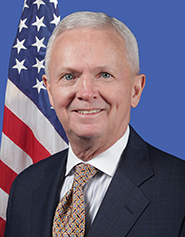
USA. A senior figure at the US Federal Aviation Administration (FAA) has urged airports to consider the use of grant money from the government to support concessionaires and other partners.
As reported, under the recent Cares Act, US Congress awarded US$10 billion in grants for airports to support them during the pandemic. This, argued organisations such as the Airport Restaurant and Retail Association (ARRA), should feed down to support business partners. ARRA has warned that some members could go out of business without relief from their airport partners.
 Speaking on an ARRA-organised call with over 1,000 North American industry executives this week (The Moodie Davitt Report Chairman Martin Moodie was a speaker last week), FAA Associate Administrator for Airports Kirk Shaffer (pictured) addressed how concession contracts and rental payments should be treated in a no-passenger scenario.
Speaking on an ARRA-organised call with over 1,000 North American industry executives this week (The Moodie Davitt Report Chairman Martin Moodie was a speaker last week), FAA Associate Administrator for Airports Kirk Shaffer (pictured) addressed how concession contracts and rental payments should be treated in a no-passenger scenario.
Shaffer said: “They [airports] should figure out a fair and equitable way to help all stakeholders come through this solvent, so that as the industry rebounds, that group of team-mates used to working together for mutual success will be there. They won’t be bankrupt or gone to another industry because the impact on aviation was so great today.”
He confirmed that the CARES Act statute says that airports can spend their grant on any lawful use of airport revenue.
“As long as it is lawful, I don’t have the power to tell an airport that they cannot do something. It is not the Airport Improvement Program (AIP). I can tell an airport it cannot add 1,000 ft to the runway with an AIP grant as it’s not justified and we won’t pay for it.
“On the other hand, if an airport wants to give their CARES Act grant to such a project, we cannot stop them. But what we have being doing is to persuade them that this is not a very smart use of their money in a health emergency, where passengers coming through terminals is down about -96%. We have guided them to get their stakeholders around the table and ask what the smart use of this money is.”


Shaffer added: “The number of instances where airports were trying to navigate a path forward that we would not have picked is the slim minority. The majority of cases are for rent deferral or abatement or modification of guarantees or suspension of rental agreements for a short term. There is a group of airports that has not yet responded. I hope that is because they are trying to get their bearings, figuring out their circumstances, and I hope we hear from those people shortly.”
Asked to advise concessionaires on how to proceed if their airport refuses to assist partners, Shaffer accepted that while the airport director may be an outstanding professional, airport ownership through a city or county led by elected officials can add a political element.
“Everyone is going to take a haircut here if we’re going to get through this with everyone solvent and in operation. I’m particularly mindful of the smaller firms and the truly ‘mom and pop’ firms that operate in airports across the system. They have less access to operating capital than other businesses do. They cannot run out and raise money in the bond market or sign a note with the bank.
“The needs of these people trying to succeed in the airport environment should help focus people, whether it’s the airport director or county commissioner, and ensure that everybody takes care of everybody else. There will have to be rent abatements, rent deferrals, and new ways to think about how to operate an airport, at least for a temporary period, so that all of us can all come out together the other side.
“If you run into circumstances where you think an airport is doing something illegal or violating their grant assurances, report that to me and my team. That has happened already; we will get right on it. Even though the CARES Act money is available for any lawful revenue use, it’s not a free for all.”
Shaffer insisted that any airport that tried to default a partner in this situation would be acting against the spirit of the legislation.
“The clear intent of Congress was to enable airports to pay their current operating expenses, and by doing that free up additional cash so that for example they can sit at the table with stakeholders and develop a plan for everyone to get through this together. We cannot force them to do that, but it’s clear from the statute that this is what Congress intended.
“If an airport sponsor were to take a CARES Act grant from us, pay all their own bills, add anything spare into a reserve account, and do nothing for their other stakeholders, or even try to default someone on their lease, we would like to talk to that airport sponsor.”














